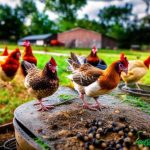Keeping rabbits and chickens together can be advantageous for small-scale farmers and homesteaders. These animals are commonly chosen for self-sufficient food production, offering complementary benefits. Rabbits provide high-quality meat and fur, while chickens supply eggs and meat.
Both species produce manure that serves as valuable fertilizer for gardens and crops. However, housing rabbits and chickens together requires careful consideration of various factors. This article examines the potential advantages and challenges associated with co-housing these animals, and offers guidance on effectively managing both species in a shared environment.
Table of Contents
- 1 Considerations for Housing Rabbits and Chickens Together
- 2 Potential Benefits of Keeping Rabbits and Chickens Together
- 3 Potential Challenges of Keeping Rabbits and Chickens Together
- 4 Tips for Successfully Keeping Rabbits and Chickens Together
- 5 Health and Safety Considerations for Rabbits and Chickens Living Together
- 6 Is Keeping Rabbits with Chickens Right for You?
- 7 FAQs
- 7.1 Can rabbits and chickens live together?
- 7.2 What are the benefits of keeping rabbits and chickens together?
- 7.3 What should be considered before keeping rabbits and chickens together?
- 7.4 How can I ensure the safety of rabbits and chickens living together?
- 7.5 What are some potential challenges of keeping rabbits and chickens together?
- 7.6 What are some tips for successfully keeping rabbits and chickens together?
Key Takeaways
- Keeping rabbits with chickens can be a beneficial and rewarding experience for homesteaders and small-scale farmers.
- When housing rabbits and chickens together, it’s important to consider the space, shelter, and social dynamics of both species.
- Potential benefits of keeping rabbits and chickens together include pest control, waste management, and companionship for the animals.
- Challenges of keeping rabbits and chickens together may include territorial behavior, potential for aggression, and different dietary needs.
- Tips for successfully keeping rabbits and chickens together include providing separate feeding areas, monitoring social interactions, and ensuring proper health and safety measures are in place.
Considerations for Housing Rabbits and Chickens Together
Space Requirements
Rabbits need a secure hutch or cage that provides them with enough room to move around and stretch out, as well as protection from predators and the elements. Chickens, on the other hand, require a coop that allows them to roost, nest, and move around freely. To accommodate both species, it’s crucial to provide separate living spaces to prevent competition and stress.
Dietary Needs
Rabbits and chickens have different dietary requirements. Rabbits primarily eat hay, vegetables, and pellets, while chickens require a diet that includes grains, seeds, and insects. It’s essential to provide separate feeding areas for each species to ensure they receive the nutrition they need.
The social dynamics between rabbits and chickens must also be considered. Rabbits can become stressed if surrounded by noisy or aggressive chickens, while chickens may become agitated if they feel threatened by rabbits. Observing their behavior and making adjustments as needed can help them coexist peacefully. Providing enrichment activities, such as toys for rabbits and perches for chickens, can also reduce stress and promote a harmonious living environment.
Potential Benefits of Keeping Rabbits and Chickens Together

There are several potential benefits to keeping rabbits and chickens together. One of the main advantages is the opportunity to create a self-sustaining ecosystem on the farm or homestead. Rabbits produce nutrient-rich manure that can be used to fertilize the soil, while chickens provide pest control by eating insects and other small creatures.
By housing rabbits and chickens together, farmers can harness the natural behaviors of both species to improve the overall health of their land and crops. Additionally, rabbits and chickens can help each other stay warm during cold weather. The body heat generated by rabbits can help keep chicken coops warm, while the presence of chickens can deter predators from approaching rabbit hutches.
Another benefit of keeping rabbits and chickens together is the potential for increased productivity. Both rabbits and chickens are prolific breeders, which means that farmers can quickly expand their herds or flocks by housing them together. This can be particularly advantageous for those looking to produce meat, fur, eggs, or even additional animals for sale or trade.
By carefully managing the breeding cycles of both species, farmers can maximize their production potential and generate a steady supply of valuable resources.
Potential Challenges of Keeping Rabbits and Chickens Together
While there are many potential benefits to keeping rabbits and chickens together, there are also several challenges to consider. One of the main challenges is the risk of disease transmission between rabbits and chickens. Both species are susceptible to certain illnesses that can be transmitted through direct contact or exposure to contaminated food or water.
It’s important to implement strict biosecurity measures when housing rabbits and chickens together to minimize the risk of disease outbreaks. This may include regular health checks, quarantine procedures for new animals, and proper sanitation practices. Another challenge of keeping rabbits and chickens together is managing their different housing and dietary needs.
Rabbits require a dry, well-ventilated hutch with plenty of bedding material, while chickens need a coop that provides protection from predators and the elements. Additionally, rabbits primarily eat hay, vegetables, and pellets, while chickens require a diet that includes grains, seeds, and insects. It’s important to carefully plan and design the living spaces for both species to ensure that their individual needs are met.
This may involve building separate enclosures or providing designated areas for feeding and watering.
Tips for Successfully Keeping Rabbits and Chickens Together
Successfully keeping rabbits and chickens together requires careful planning and management. One important tip is to provide separate living spaces for each species to ensure their safety and well-being. This may involve building separate hutches or coops, or using dividers within a larger enclosure to create distinct areas for rabbits and chickens.
Additionally, it’s important to provide separate feeding areas for each species to prevent competition and ensure that both rabbits and chickens receive the nutrition they need. Another tip for successfully keeping rabbits and chickens together is to monitor their behavior closely when they are introduced to each other. It’s important to observe how both species interact and make adjustments as needed to promote a harmonious living environment.
Providing enrichment activities, such as toys for rabbits and perches for chickens, can also help reduce stress and boredom for both species. Additionally, it’s important to implement strict biosecurity measures to minimize the risk of disease transmission between rabbits and chickens.
Health and Safety Considerations for Rabbits and Chickens Living Together

Preventing Disease Transmission
Implementing strict biosecurity measures is crucial to minimize the risk of disease transmission between rabbits and chickens. Regular health monitoring is vital, and any signs of illness or injury should be addressed promptly with veterinary care.
Providing a Healthy Environment
Cleanliness is key to maintaining a healthy environment for rabbits and chickens. Providing clean bedding material for rabbits and regularly cleaning chicken coops can prevent the buildup of bacteria and parasites. A balanced diet is also essential, with rabbits requiring access to hay, vegetables, and pellets, and chickens needing grains, seeds, and insects. Fresh water should always be available to prevent dehydration.
Ensuring Safety and Security
Safety considerations are paramount when housing rabbits and chickens together. Secure enclosures are necessary to protect them from predators, and wire mesh or fencing can be used to create a barrier around their living spaces. Regular inspections of enclosures are also crucial to identify any signs of wear or damage that could compromise their security.
Is Keeping Rabbits with Chickens Right for You?
In conclusion, keeping rabbits with chickens can be a rewarding experience that offers several potential benefits, including increased productivity and the opportunity to create a self-sustaining ecosystem on the farm or homestead. However, there are also several important considerations to take into account, including space requirements, dietary needs, social dynamics, disease transmission risks, and health and safety considerations. By carefully planning and managing the living environment for both species, it is possible to successfully keep rabbits and chickens together while ensuring their well-being.
Ultimately, whether keeping rabbits with chickens is right for you will depend on your specific goals, resources, and level of commitment. If you are willing to invest the time and effort required to provide separate living spaces, manage their dietary needs, monitor their behavior closely, implement strict biosecurity measures, prioritize their health and safety, then keeping rabbits with chickens may be a suitable option for you. However, if you are unable to meet these requirements or have concerns about managing both species together, it may be best to consider alternative options for raising rabbits and chickens separately.
If you’re considering keeping rabbits with chickens, you may also be interested in learning about where to put a chicken coop. This article from Poultry Wizard provides valuable information on the best location for your chicken coop to ensure the health and safety of your flock. Learn more about where to put a chicken coop here.
FAQs
Can rabbits and chickens live together?
Yes, rabbits and chickens can live together in the same space, as long as they have enough room and proper housing to meet their individual needs.
What are the benefits of keeping rabbits and chickens together?
Keeping rabbits and chickens together can provide mutual benefits, such as companionship, pest control, and efficient use of space and resources.
What should be considered before keeping rabbits and chickens together?
Before keeping rabbits and chickens together, it’s important to consider their individual needs, such as housing, diet, and potential conflicts. Proper planning and management are essential for their well-being.
How can I ensure the safety of rabbits and chickens living together?
To ensure the safety of rabbits and chickens living together, provide secure housing to protect them from predators, and monitor their interactions to prevent any aggressive behavior.
What are some potential challenges of keeping rabbits and chickens together?
Some potential challenges of keeping rabbits and chickens together include territorial disputes, competition for resources, and the risk of disease transmission. Proper management and monitoring can help mitigate these challenges.
What are some tips for successfully keeping rabbits and chickens together?
Some tips for successfully keeping rabbits and chickens together include providing separate feeding and watering stations, ensuring adequate space for both species, and monitoring their interactions to address any issues promptly.
Meet Walter, the feathered-friend fanatic of Florida! Nestled in the sunshine state, Walter struts through life with his feathered companions, clucking his way to happiness. With a coop that’s fancier than a five-star hotel, he’s the Don Juan of the chicken world. When he’s not teaching his hens to do the cha-cha, you’ll find him in a heated debate with his prized rooster, Sir Clucks-a-Lot. Walter’s poultry passion is no yolk; he’s the sunny-side-up guy you never knew you needed in your flock of friends!







